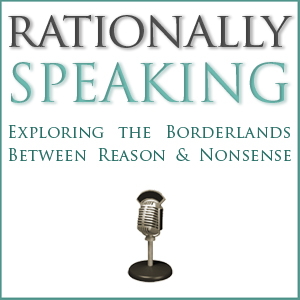Rationally Speaking #212 - Ed Boyden on "How to invent game-changing technologies"
Rationally Speaking Podcast
New York City Skeptics
4.6 • 787 Ratings
🗓️ 9 July 2018
⏱️ 49 minutes
🧾️ Download transcript
Summary
Transcript
Click on a timestamp to play from that location
| 0:00.0 | This episode of Rationally Speaking is brought to you by Stripe. |
| 0:03.4 | Stripe builds economic infrastructure for the Internet. |
| 0:06.8 | Their tools help online businesses with everything from incorporation and getting started |
| 0:11.0 | to handling marketplace payments to preventing fraud. |
| 0:15.5 | Stripe's culture puts a special emphasis on rigorous thinking and intellectual curiosity. |
| 0:20.8 | So if you enjoy podcasts like this one, |
| 0:23.3 | and you're interested in what Stripe does, I'd recommend you check them out. They're always hiring. |
| 0:28.1 | Learn more at Stripe.com. Welcome to Rationally Speaking, the podcast where we explore the borderlands between reason and nonsense. |
| 0:49.3 | I'm your host, Julia Galef, and I'm here with today's guest, Ed Boyden. |
| 0:53.1 | Ed is a neuroscientist at MIT, |
| 0:55.1 | who has pioneered two technologies that have been and slash are about to be really transformative |
| 1:00.6 | for what we're able to do in neuroscience. Optogenetics, which was called, quote, arguably the most |
| 1:06.0 | important technical advanced in neuroscience in the past 40 years, and then more recently |
| 1:09.8 | expansion microscopy. |
| 1:11.7 | Ed has won a bunch of awards, including the prestigious Brain Prize. |
| 1:16.0 | Perhaps my favorite award that he's won was mentioned in an article about him that I happened to read. |
| 1:21.5 | It was a certificate in his office for, quote, Mr. Most Likely to Be Late, because he is teaching students how to build a microscope. |
| 1:27.8 | Ed, welcome to the show. That's great to be here, Joy, Mr. Most Likely to Be Late because he is teaching students how to build a microscope. Ed, welcome to the show. |
| 1:29.4 | That's great to be here, Joy. |
| 1:31.5 | So I have a lot that I want to cover with you. |
| 1:34.8 | First, I want to talk about why optogenetics and expansion microscopy are so revolutionary. |
| 1:40.4 | And then I want to jump meta, which will not be a surprise to any of my listeners, and talk a little bit about what's your process from making major innovations like that? Like, what heuristics are you following for scientific research and just for thinking in general that are so effective as to produce two major breakthroughs in basically a decade. You're only in your 30s. |
... |
Please login to see the full transcript.
Disclaimer: The podcast and artwork embedded on this page are from New York City Skeptics, and are the property of its owner and not affiliated with or endorsed by Tapesearch.
Generated transcripts are the property of New York City Skeptics and are distributed freely under the Fair Use doctrine. Transcripts generated by Tapesearch are not guaranteed to be accurate.
Copyright © Tapesearch 2025.

